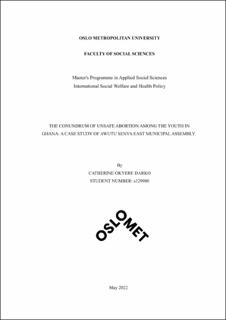The conundrum of unsafe abortion among the youth in Ghana: A case of Awutu Senya East Municipal Assembly.
Master thesis
Published version
Permanent lenke
https://hdl.handle.net/11250/3018001Utgivelsesdato
2022Metadata
Vis full innførselSamlinger
Sammendrag
The United Nations sustainable development goal 5 focused on Achieving Gender Equality and Empowering Women and Girls. This empowerment requires that women have channels through which the sexual, reproductive, economic and legal aspects of their lives are largely within their power and /or control. Achieving sustainable development goal 5 requires tackling the issue of unsafe abortion among youth because it has been a major contributor to loss of life of pregnant women. Unsafe abortion has been described as a public health threat especially in less developed countries where even safe abortion is frowned upon by religious beliefs and teaching, cultural norms, and values as well as societal structures. People therefore resort to unsafe means to terminate a pregnancy.
Using case study research design, data on unsafe abortion was gathered from 160 sampled females who have age boundaries of between 19 to 40 years through questionnaire administration, key informant and focus group discussions. The study was geographically limited to the Awutu Senya District in the Central Region of Ghana
Findings from the study revealed that, (female) youth had knowledge of safe and unsafe abortion in relation to abortion practitioners, substances used and their sources as well as the methods used in terminating the unwanted pregnancy.
A young woman's decision to engage in unsafe abortion can be influenced by economic factors (financial difficulty in securing a safe procedure), social and societal factors (unpreparedness to bear child, desire to continue with education), health factors (fear of surgery, contraceptive failure) fear of parents, stigmatization from community members and partner denial.
Access to safe abortion was challenged by way of cost involved in safe abortion, religious and cultural beliefs, fear of death, poor public health education and inadequate heath facilities carrying out safe abortion. Based on findings, the study recommends government to cover cost of safe abortion on the National Health Insurance System (NHIS) at least for females below 25 years as well community sensitization on the relevance of safe abortion to the girl child development among other things.
